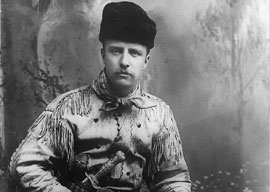
April 06, 2014

Young Theodore Roosevelt
Patriotic effusions, whosever they may be, seldom please citizens of other nations, because they are generally so self-congratulatory; and self-congratulation, which is no doubt an inescapable part of the human condition, is best kept to oneself even when justified. Occasional outbursts may be acceptable, as after a triumph in a just war”but just wars are themselves infrequent events in human history. Ignorance of and disdain for others are often the corollaries of noisy patriotism; it was with good reason that Doctor Johnson said that patriotism is the last refuge of a scoundrel. Quite often it is the first refuge as well.
On the other hand, some kind of collective self-belief is necessary, for otherwise effort would be in vain and achievement impossible. A country completely without patriotism, even if this state remained implicit rather than explicit, would be an unhappy place. As in most things human, a balance must be struck.
I mention this because I recently came across a description of Americanism by Theodore Roosevelt. Among American virtues, he said, were respect for the rights of others; freedom of opinion; religious tolerance; equality under the law; and “at least a measurable quality of opportunity.” This last was important: Roosevelt wisely did not employ a shibboleth of our time, equality of opportunity.
Roosevelt was not a political philosopher, and no doubt his statement can be criticized for its inconsistencies (but so can the statements of most political philosophers). He says that “all privileges based on wealth are un-American,” by which he must have meant legally inscribed privileges, for in the imperfect, sublunary world wealth will always have, or buy, its privileges. For example, an accused wealthy man will generally have a better legal team to defend him than an impoverished accused man. And Roosevelt added that “all enmity to honest men merely because they are wealthy” is equally un-American; in which case one can only surmise that either America is fast becoming un-American, or no wealthy man in America is honest.
But to return to the question of opportunity versus equality of opportunity: Roosevelt can hardly have failed to notice that, as the scion of a rich family, his opportunities were greater than those of the majority of his fellow citizens. On the other hand, he made the most of them by fierce efforts in many different fields of endeavor; indeed, he was famously in favor of the strenuous rather than the easeful life. He did not content himself with frittering away his inherited fortune as many a young sprig has done (and as I think I might well have done, had I had a fortune to fritter). Nor was Roosevelt the kind of man to deny anyone his chance merely because he was not well-born. Opportunity, yes, then; equality of opportunity, no.
But to oppose the notion of equality of opportunity these days is to be thought some kind of monstrous ultramontane reactionary, a Metternich or Nicholas I, who wants by means of repression to preserve the status quo in amber. Members of young audiences to which I have spoken have almost fainted with shock when I have said that I not only did not believe in equality of opportunity, but to the contrary found the very idea sinister in the extreme, and much worse than mere egalitarianism of outcome. To say to a young audience today that equality of opportunity is a thoroughly vicious idea is like shouting “God does not exist and Mohammed was not his prophet” at the top of one’s voice in Mecca.